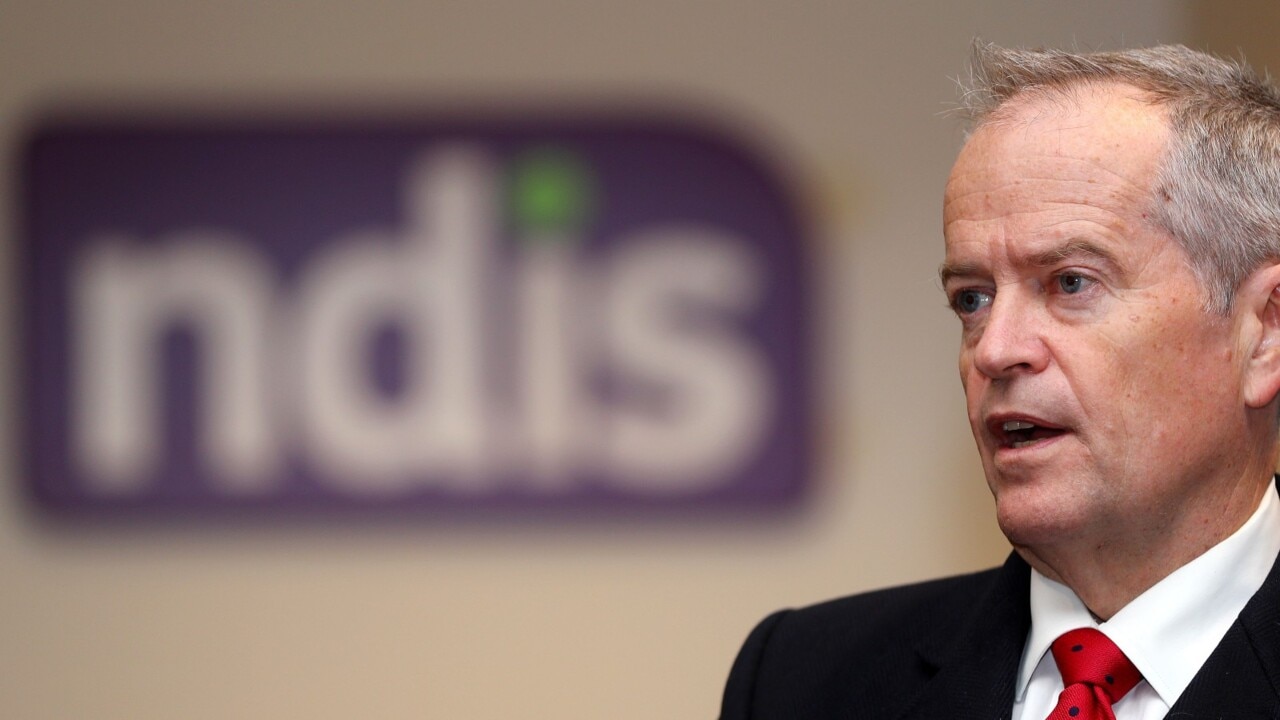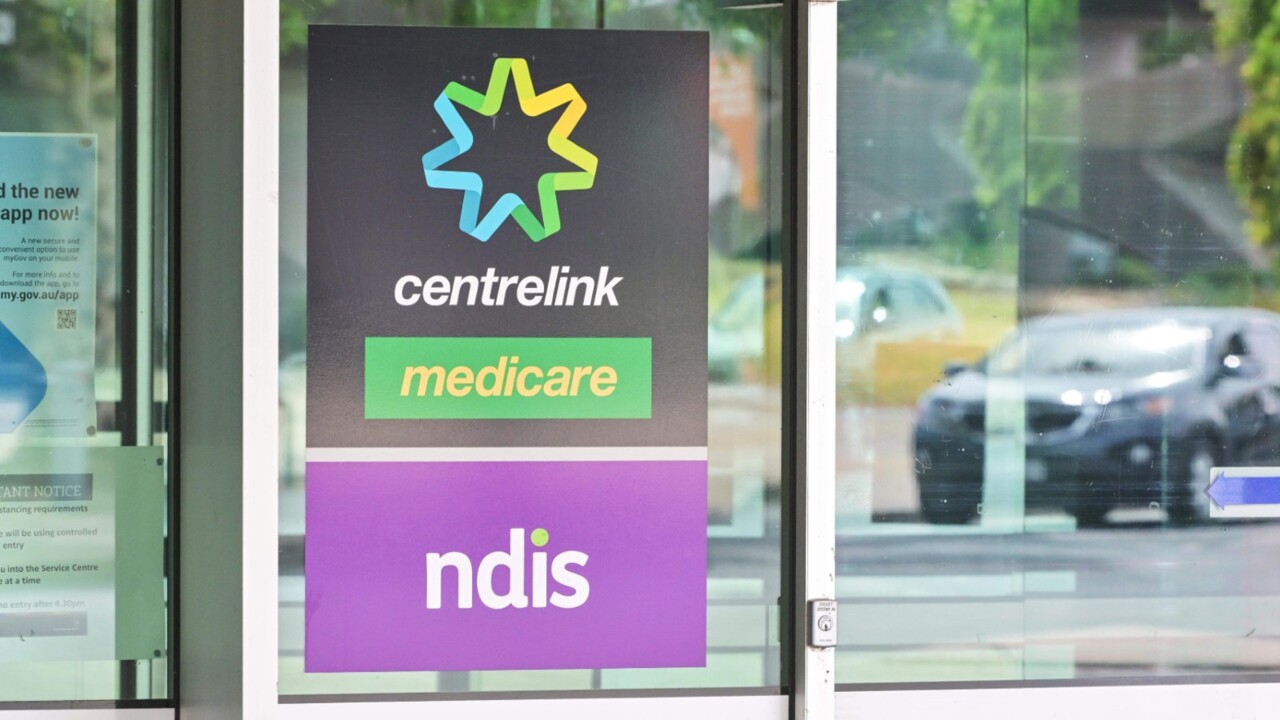Billions spent to bring states to the table on disability
States and territories will get more than $10.5bn in GST top-ups and tens of billions in extra funding to seal an agreement doubling their NDIS contributions.

Anthony Albanese has gifted premiers and chief ministers more than $10.5bn in GST top-ups and tens of billions of dollars extra for healthcare in exchange for doubling the annual increase in state and territory funding for the NDIS from 2028.
The Prime Minister on Wednesday caved in to demands from the states and territories to maintain Scott Morrison’s generous GST top-up payments until the end of the decade in return for their support to stump up more for the ballooning $42bn NDIS.
Under a new funding compact, announced 24 hours before Bill Shorten releases a review into the financially unsustainable NDIS, state and territory governments sealed a deal doubling the cap on the increase in their yearly contributions at 8 per cent.
The Albanese government, which has committed to reining in NDIS funding to 8 per cent annual growth, remains financially exposed if the cost-cutting aims of the program are not realised, as its contributions are uncapped.
The NDIS was expected to blow out to almost $100bn by 2032 before national cabinet endorsed limiting its spending growth.
Premiers and chief ministers also secured a generous 50-50 funding split to establish a new scheme aimed at providing foundational supports for disabled people who would no longer qualify for the scheme, including kids with early developmental challenges and mild autism.

The states’ contributions to the foundational support programs will be capped, putting the federal government on the hook for more money if there are cost blowouts.
Following a national cabinet meeting in Canberra, Mr Albanese announced the commonwealth would extend the GST “no-worse-off guarantee” for three years from 2027-28. The commonwealth will provide $3.5bn in top-up payments in the first year and higher amounts in the second and third year.
Mr Albanese and Jim Chalmers were put on notice by east-coast premiers after the meeting that they would continue fighting for more GST money to secure their “fair share”.
The federal government also committed to increasing National Health Reform Agreement funding from 2025 to 45 per cent over 10 years and replacing a 6.5 per cent health funding cap with “a more generous” spend.
From 2025, the commonwealth will provide an extra $13.2bn over five years under a new hospitals agreement. Government sources said the new funding cap, which is not finalised, would be several percentage points higher, and states and territories would be provided with a first-year catch-up premium to clear out elective surgery backlogs.
The Australian Medical Association, which described the deal as a “welcome start to addressing issues that are crippling Australia’s health system”, had pushed for an additional $20.5bn across four years under a 50-50 funding share and removal of the cap.
Mr Albanese, who will also top up Medicare funding by $1.2bn to alleviate pressures across the hospital system, said national cabinet had locked in “long-term structural health reform” and a more sustainable NDIS for future generations.
He said governments would implement legislative and funding changes to the NDIS to “improve the experience of participants and restore the original intent of the scheme to support people with permanent and significant disability”.

Mr Shorten, who will release the NDIS review authored by scheme architect Bruce Bonyhady and Lisa Paul on Wednesday, is leading the government’s Financial Sustainability Framework setting an annual growth target of 8 per cent by mid-2026, down from the current 14 per cent yearly rise in costs.
The framework underpinned billions of dollars in savings and lower deficits in the May 9 budget but no modelling or explanation of the plan was included in Treasury papers. The budget baked in $15bn in reduced NDIS growth over the forward estimates.
After Mr Shorten in June was forced to backtrack on his claim that it’s “not the end of the world” if the government failed to hit its NDIS growth target, Mr Albanese said on Wednesday “this is about capping growth at 8 per cent”.
Saul Eslake, a former ANZ and Bank of America Merrill Lynch chief economist, accused the Albanese government of “kicking the can down the road” on GST funding for another three years.
Mr Eslake, who describes the GST top-up arrangement as one of the “worst public-policy decisions of the last 25 years”, said “it’s all about gaining or retaining seats in WA”.
“The government has completely avoided the more fundamental question of why it should be … giving so much money to the government of the richest state in the country so that its citizens can have lower state taxes and better public services than people in the eastern states,” Mr Eslake said.
“It is the only government in Australia, and one of barely a handful anywhere in the world, that is running and expects to continue running budget surpluses. How Mr Albanese and Dr (Jim) Chalmers reconcile that with their professed commitments to equity and fiscal prudence is completely beyond me.”
South Australia Premier Peter Malinauskas said GST top-up payments should not be “time-limited” and warned of another fight in three years.
Tasmanian Premier Jeremy Rockliff said his government had “scored a key win in the fight” for the state’s fair share of GST. “We will not stop our pursuit of a permanent and ongoing agreement to ensure that we always receive our fair share,” he said.
The government last week railed against demands from state treasurers to maintain the GST deal because most states and territories had forecast operating surpluses by 2025-26. In contrast, the commonwealth expects to maintain operating deficits over the medium-term. About 46 per cent of state revenue in 2022-23 came from the commonwealth, which is expected to hit 48 per cent within four years.
After claiming on Monday he would not sign up to “something where we don’t know what the cost to the states is going to be”, WA Premier Roger Cook conceded he had not been provided with costings on a new disability foundational support program.
Opposition NDIS spokesman Michael Sukkar said the government should be upfront about whether it would cut plans and remove participants from the scheme. Disability advocates said they were “concerned by language” used by Mr Albanese about NDIS eligibility.







To join the conversation, please log in. Don't have an account? Register
Join the conversation, you are commenting as Logout